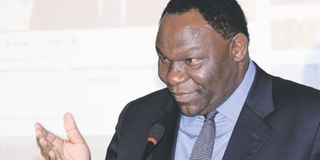Internet service providers to meet over lower costs

WILLIAM OERI | NATION
Information and Communications PS Bitange Ndemo during Wednesday’s interactive meeting on the Kenya Open Data Portal at the InterContinental Hotel, Nairobi. He defended the government’s decision to award the second digital television licence to a Chinese company.
Internet service providers are expected to meet today to discuss ways of bringing down charges in line with a recent presidential directive.
The meeting, which will be convened by the government, will also discuss the management and usage of state-owned inland fibre optic network — National Optic Fibre Backbone Infrastructure (Nofbi).
“We are meeting all operators to look for ways Internet costs can come down,” Information permanent secretary Bitange Ndemo said Wednesday.
“We have started to implement the presidential directive to see Internet costs come down.”
On July 8, President Kibaki directed the Information and Communications ministry to move with speed and engage industry players to ensure Internet access cost is affordable.
This came two years after the undersea fibre optic cable that was praised as the panacea for cheap and fast Internet for consumers came live.
“Kenyans are not yet enjoying the full benefits of fibre optic connections that were meant to deal with these issues of cost,” the President said while launching a government open data website (www.opendata.go.ke) that aims to boost transparency in governance and empower citizens with relevant information.
Kenya is now hooked to three international sub-marine fibre optic cables (privately owned Seacom, and government spearheaded Teams and Eassy), which have seen a 90 per cent drop in connectivity costs for big players — benefits citizens are yet to enjoy.
The wholesale prices on international fibre optic cables have come down to Sh36,000 ($400) from Sh315,000 ($3,500) previously charged by satellite service providers since Seacom, Teams and Eassy gave Kenya undersea fibre connections.
ISPs, who buy bandwidth in bulk from broadband high speed Internet sellers such as Seacom, Teams and Eassy and repackage it to sell to consumers, still charge highly. Industry regulator Communication Commission of Kenya (CCK) statistics show Kenya has 10.2 million Internet subscribers. Most of them access the service on phones, meaning, they don’t enjoy the high speeds.
The meeting comes at an appropriate time since, players say it will help them push for an agenda largely around incentives to help them recoup their investments.
“We are happy that the government has convened this meeting; it’s time to have a serious look at Internet pricing,” Safaricom’s corporate affairs director Nzioka Waita said, adding: “The complete value chain has to be looked at for all to benefit.”
Dr Ndemo spoke at a meeting with editors yesterday on how they could take advantage of the open data. He said a week after the website’s launch, 100 applications had been designed by Kenyans for use on the portal.
“We have to look at a broader aspect on how open data will drive the growth of innovations,” he said.
Through the portal, the government has released large data sets, including the national census and statistics on government spending at national and county levels.
Telkom Kenya has the right to run Nofbi on behalf of the State and sells capacity to other operators.




